 Multiple Exceptions (user mode) - Modeling Example
Multiple Exceptions (user mode) - Modeling Example Multiple Exceptions (kernel mode)
Multiple Exceptions (kernel mode) Multiple Exceptions (managed space)
Multiple Exceptions (managed space)- Multiple Exceptions (stowed)
 Dynamic Memory Corruption (process heap)
Dynamic Memory Corruption (process heap) Dynamic Memory Corruption (kernel pool)
Dynamic Memory Corruption (kernel pool)- Dynamic Memory Corruption (managed heap)
 False Positive Dump
False Positive Dump Lateral Damage (general)
Lateral Damage (general)- Lateral Damage (CPU mode)
 Optimized Code (function parameter reuse)
Optimized Code (function parameter reuse) Invalid Pointer (general)
Invalid Pointer (general)- Invalid Pointer (objects)
 NULL Pointer (code)
NULL Pointer (code) NULL Pointer (data)
NULL Pointer (data) Inconsistent Dump
Inconsistent Dump Hidden Exception (user space)
Hidden Exception (user space)- Hidden Exception (kernel space)
- Hidden Exception (managed space)
 Deadlock (critical sections)
Deadlock (critical sections) Deadlock (executive resources)
Deadlock (executive resources) Deadlock (mixed objects, user space)
Deadlock (mixed objects, user space) Deadlock (LPC)
Deadlock (LPC) Deadlock (mixed objects, kernel space)
Deadlock (mixed objects, kernel space) Deadlock (self)
Deadlock (self)- Deadlock (managed space)
- Deadlock (.NET Finalizer)
 Changed Environment
Changed Environment Incorrect Stack Trace
Incorrect Stack Trace OMAP Code Optimization
OMAP Code Optimization No Component Symbols
No Component Symbols Insufficient Memory (committed memory)
Insufficient Memory (committed memory) Insufficient Memory (handle leak)
Insufficient Memory (handle leak) Insufficient Memory (kernel pool)
Insufficient Memory (kernel pool) Insufficient Memory (PTE)
Insufficient Memory (PTE) Insufficient Memory (module fragmentation)
Insufficient Memory (module fragmentation) Insufficient Memory (physical memory)
Insufficient Memory (physical memory) Insufficient Memory (control blocks)
Insufficient Memory (control blocks)- Insufficient Memory (reserved virtual memory)
- Insufficient Memory (session pool)
- Insufficient Memory (stack trace database)
- Insufficient Memory (region)
- Insufficient Memory (stack)
 Spiking Thread
Spiking Thread Module Variety
Module Variety Stack Overflow (kernel mode)
Stack Overflow (kernel mode) Stack Overflow (user mode)
Stack Overflow (user mode) Stack Overflow (software implementation)
Stack Overflow (software implementation)- Stack Overflow (insufficient memory)
- Stack Overflow (managed space)
 Managed Code Exception
Managed Code Exception- Managed Code Exception (Scala)
- Managed Code Exception (Python)
 Truncated Dump
Truncated Dump Waiting Thread Time (kernel dumps)
Waiting Thread Time (kernel dumps) Waiting Thread Time (user dumps)
Waiting Thread Time (user dumps) Memory Leak (process heap) - Modeling Example
Memory Leak (process heap) - Modeling Example Memory Leak (.NET heap)
Memory Leak (.NET heap)- Memory Leak (page tables)
- Memory Leak (I/O completion packets)
- Memory Leak (regions)
 Missing Thread (user space)
Missing Thread (user space)- Missing Thread (kernel space)
 Unknown Component
Unknown Component Double Free (process heap)
Double Free (process heap) Double Free (kernel pool)
Double Free (kernel pool) Coincidental Symbolic Information
Coincidental Symbolic Information Stack Trace
Stack Trace- Stack Trace (I/O request)
- Stack Trace (file system filters)
- Stack Trace (database)
- Stack Trace (I/O devices)
 Virtualized Process (WOW64)
Virtualized Process (WOW64)- Virtualized Process (ARM64EC and CHPE)
 Stack Trace Collection (unmanaged space)
Stack Trace Collection (unmanaged space)- Stack Trace Collection (managed space)
- Stack Trace Collection (predicate)
- Stack Trace Collection (I/O requests)
- Stack Trace Collection (CPUs)
 Coupled Processes (strong)
Coupled Processes (strong) Coupled Processes (weak)
Coupled Processes (weak) Coupled Processes (semantics)
Coupled Processes (semantics) High Contention (executive resources)
High Contention (executive resources) High Contention (critical sections)
High Contention (critical sections) High Contention (processors)
High Contention (processors)- High Contention (.NET CLR monitors)
- High Contention (.NET heap)
- High Contention (sockets)
 Accidental Lock
Accidental Lock Passive Thread (user space)
Passive Thread (user space) Passive System Thread (kernel space)
Passive System Thread (kernel space) Main Thread
Main Thread Busy System
Busy System Historical Information
Historical Information Object Distribution Anomaly (IRP)
Object Distribution Anomaly (IRP)- Object Distribution Anomaly (.NET heap)
 Local Buffer Overflow (user space)
Local Buffer Overflow (user space)- Local Buffer Overflow (kernel space)
 Early Crash Dump
Early Crash Dump Hooked Functions (user space)
Hooked Functions (user space) Hooked Functions (kernel space)
Hooked Functions (kernel space)- Hooked Modules
 Custom Exception Handler (user space)
Custom Exception Handler (user space) Custom Exception Handler (kernel space)
Custom Exception Handler (kernel space) Special Stack Trace
Special Stack Trace Manual Dump (kernel)
Manual Dump (kernel) Manual Dump (process)
Manual Dump (process) Wait Chain (general)
Wait Chain (general) Wait Chain (critical sections)
Wait Chain (critical sections) Wait Chain (executive resources)
Wait Chain (executive resources) Wait Chain (thread objects)
Wait Chain (thread objects) Wait Chain (LPC/ALPC)
Wait Chain (LPC/ALPC) Wait Chain (process objects)
Wait Chain (process objects) Wait Chain (RPC)
Wait Chain (RPC) Wait Chain (window messaging)
Wait Chain (window messaging) Wait Chain (named pipes)
Wait Chain (named pipes)- Wait Chain (mutex objects)
- Wait Chain (pushlocks)
- Wait Chain (CLR monitors)
- Wait Chain (RTL_RESOURCE)
- Wait Chain (modules)
- Wait Chain (nonstandard synchronization)
- Wait Chain (C++11, condition variable)
- Wait Chain (SRW lock)
 Corrupt Dump
Corrupt Dump Dispatch Level Spin
Dispatch Level Spin No Process Dumps
No Process Dumps No System Dumps
No System Dumps Suspended Thread
Suspended Thread Special Process
Special Process Frame Pointer Omission
Frame Pointer Omission False Function Parameters
False Function Parameters Message Box
Message Box Self-Dump
Self-Dump Blocked Thread (software)
Blocked Thread (software) Blocked Thread (hardware)
Blocked Thread (hardware)- Blocked Thread (timeout)
 Zombie Processes
Zombie Processes Wild Pointer
Wild Pointer Wild Code
Wild Code Hardware Error
Hardware Error Handle Limit (GDI, kernel space)
Handle Limit (GDI, kernel space)- Handle Limit (GDI, user space)
 Missing Component (general)
Missing Component (general) Missing Component (static linking, user mode)
Missing Component (static linking, user mode) Execution Residue (unmanaged space, user)
Execution Residue (unmanaged space, user)- Execution Residue (unmanaged space, kernel)
- Execution Residue (managed space)
 Optimized VM Layout
Optimized VM Layout- Invalid Handle (general)
- Invalid Handle (managed space)
- Overaged System
- Thread Starvation (realtime priority)
- Thread Starvation (normal priority)
- Duplicated Module
- Not My Version (software)
- Not My Version (hardware)
- Data Contents Locality
- Nested Exceptions (unmanaged code)
- Nested Exceptions (managed code)
- Affine Thread
- Self-Diagnosis (user mode)
- Self-Diagnosis (kernel mode)
- Self-Diagnosis (registry)
- Inline Function Optimization (unmanaged code)
- Inline Function Optimization (managed code)
- Critical Section Corruption
- Lost Opportunity
- Young System
- Last Error Collection
- Hidden Module
- Data Alignment (page boundary)
- C++ Exception
- Divide by Zero (user mode)
- Divide by Zero (kernel mode)
- Swarm of Shared Locks
- Process Factory
- Paged Out Data
- Semantic Split
- Pass Through Function
- JIT Code (.NET)
- JIT Code (Java)
- Ubiquitous Component (user space)
- Ubiquitous Component (kernel space)
- Nested Offender
- Virtualized System
- Effect Component
- Well-Tested Function
- Mixed Exception
- Random Object
- Missing Process
- Platform-Specific Debugger
- Value Deviation (stack trace)
- Value Deviation (structure field)
- Runtime Thread (CLR)
- Runtime Thread (Python, Linux)
- Coincidental Frames
- Fault Context
- Hardware Activity
- Incorrect Symbolic Information
- Message Hooks - Modeling Example
- Coupled Machines
- Abridged Dump
- Exception Stack Trace
- Distributed Spike
- Instrumentation Information
- Template Module
- Invalid Exception Information
- Shared Buffer Overwrite
- Pervasive System
- Problem Exception Handler
- Same Vendor
- Crash Signature
- Blocked Queue (LPC/ALPC)
- Fat Process Dump
- Invalid Parameter (process heap)
- Invalid Parameter (runtime function)
- String Parameter
- Well-Tested Module
- Embedded Comment
- Hooking Level
- Blocking Module
- Dual Stack Trace
- Environment Hint
- Top Module
- Livelock
- Technology-Specific Subtrace (COM interface invocation)
- Technology-Specific Subtrace (dynamic memory)
- Technology-Specific Subtrace (JIT .NET code)
- Technology-Specific Subtrace (COM client call)
- Dialog Box
- Instrumentation Side Effect
- Semantic Structure (PID.TID)
- Directing Module
- Least Common Frame
- Truncated Stack Trace
- Data Correlation (function parameters)
- Data Correlation (CPU times)
- Module Hint
- Version-Specific Extension
- Cloud Environment
- No Data Types
- Managed Stack Trace
- Managed Stack Trace (Scala)
- Managed Stack Trace (Python)
- Coupled Modules
- Thread Age
- Unsynchronized Dumps
- Pleiades
- Quiet Dump
- Blocking File
- Problem Vocabulary
- Activation Context
- Stack Trace Set
- Double IRP Completion
- Caller-n-Callee
- Annotated Disassembly (JIT .NET code)
- Annotated Disassembly (unmanaged code)
- Handled Exception (user space)
- Handled Exception (.NET CLR)
- Handled Exception (kernel space)
- Duplicate Extension
- Special Thread (.NET CLR)
- Hidden Parameter
- FPU Exception
- Module Variable
- System Object
- Value References
- Debugger Bug
- Empty Stack Trace
- Problem Module
- Disconnected Network Adapter
- Network Packet Buildup
- Unrecognizable Symbolic Information
- Translated Exception
- Regular Data
- Late Crash Dump
- Blocked DPC
- Coincidental Error Code
- Punctuated Memory Leak
- No Current Thread
- Value Adding Process
- Activity Resonance
- Stored Exception
- Spike Interval
- Stack Trace Change
- Unloaded Module
- Deviant Module
- Paratext
- Incomplete Session
- Error Reporting Fault
- First Fault Stack Trace
- Frozen Process
- Disk Packet Buildup
- Hidden Process
- Active Thread (Mac OS X)
- Active Thread (Windows)
- Critical Stack Trace
- Handle Leak
- Module Collection
- Module Collection (predicate)
- Deviant Token
- Step Dumps
- Broken Link
- Debugger Omission
- Glued Stack Trace
- Reduced Symbolic Information
- Injected Symbols
- Distributed Wait Chain
- One-Thread Process
- Module Product Process
- Crash Signature Invariant
- Small Value
- Shared Structure
- Thread Cluster
- False Effective Address
- Screwbolt Wait Chain
- Design Value
- Hidden IRP
- Tampered Dump
- Memory Fluctuation (process heap)
- Last Object
- Rough Stack Trace (unmanaged space)
- Rough Stack Trace (managed space)
- Past Stack Trace
- Ghost Thread
- Dry Weight
- Exception Module
- Reference Leak
- Origin Module
- Hidden Call
- Corrupt Structure
- Software Exception
- Crashed Process
- Variable Subtrace
- User Space Evidence
- Internal Stack Trace
- Distributed Exception (managed code)
- Thread Poset
- Stack Trace Surface
- Hidden Stack Trace
- Evental Dumps
- Clone Dump
- Parameter Flow
- Critical Region
- Diachronic Module
- Constant Subtrace
- Not My Thread
- Window Hint
- Place Trace
- Stack Trace Signature
- Relative Memory Leak
- Quotient Stack Trace
- Module Stack Trace
- Foreign Module Frame
- Unified Stack Trace
- Mirror Dump Set
- Memory Fibration
- Aggregated Frames
- Frame Regularity
- Stack Trace Motif
- System Call
- Stack Trace Race
- Hyperdump
- Disassembly Ambiguity
- Exception Reporting Thread
- Active Space
- Subsystem Modules
- Region Profile
- Region Clusters
- Source Stack Trace
- Hidden Stack
- Interrupt Stack
- False Memory
- Frame Trace
- Pointer Cone
- Context Pointer
- Pointer Class
- False Frame
- Procedure Call Chain
- C++ Object
- COM Exception
- Structure Sheaf
- Saved Exception Context (.NET)
- Shared Thread
- Spiking Interrupts
- Structure Field Collection
- Black Box
- Rough Stack Trace Collection (unmanaged space)
- COM Object
- Shared Page
- Exception Collection
- Dereference Nearpoint
- Address Representations
- Near Exception
- Shadow Stack Trace
- Past Process
- Foreign Stack
- Annotated Stack Trace
- Disassembly Summary
- Region Summary
- Analysis Summary
- Region Spectrum
- Normalized Region
- Function Pointer
- Interrupt Stack Collection
- DPC Stack Collection
- Dump Context
- False Local Address
- Encoded Pointer
- Latent Structure
- ISA-Specific Code
Introducing Software Narratology of Things (Software NT)
This is the further development of Software Narratology (T -> M) and Generalized Software Narratives (M -> M -> M -> ...). Now it incorporates devices (things) and IoT. Whereas the general narrative space is 2M1T:
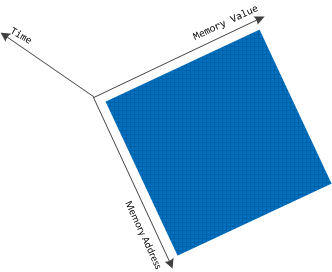
the narrative space of NT is "complex" 2M2T:
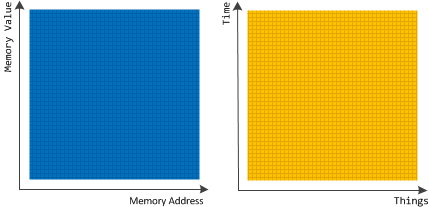
Narratology of Things also incorporates Hardware Narratology.
ADDR Pattern Catalogue
In addition to existing pattern catalogues we introduce patterns (and their schemas) of disassembly (decompilation), reversing and reconstruction (deconstruction). Here's the current list in the order of their appearance in Accelerated Disassembly, Reconstruction and Reversing training:
- Universal Pointer
- Symbolic Pointer S2
- Interpreted Pointer S3
- Context Pyramid
- Potential Functionality
- Function Skeleton
- Function Call
- Call Path
- Local Variable
- Static Variable
- Pointer Dereference
- Function Prologue
- Function Epilogue
- Variable Initialization
- Memory Copy
- Call Prologue
- Call Parameter
- Call Epilogue
- Call Result
- Control Path
- Function Parameter
- Structure Field
- Last Call
- Loop
- Separator Frames
- Virtual Call
- Component Dependencies
- API Trace
The Old New Crash: Cloud Memory Dump Analysis
The following direct links can be used to order the book now:
Buy Kindle or Paperback
or Paperback from Amazon
from Amazon
Buy Paperback from Barnes & Noble
Buy Paperback from Book Depository
Available for SkillSoft Books24x7 subscribers
This is a transcript of Software Diagnostics Services (former Memory Dump Analysis Services) seminar about a uniform methodology and tools for analysis of crashes, hangs, and other types of abnormal software behaviour in cloud environments.
- Title: The Old New Crash: Cloud Memory Dump Analysis
- Authors: Dmitry Vostokov, Software Diagnostics Services
- Publisher: OpenTask (August 2011)
- Language: English
- Product Dimensions: 28.0 x 21.6
- Paperback: 40 pages
- ISBN-13: 978-1908043283
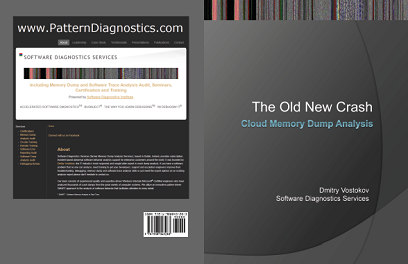
An Introduction to Mobile Software Diagnostics
The following direct links can be used to order the book now:
Buy Kindle version
Buy Paperback from Amazon
from Amazon
Buy Paperback from Barnes & Noble
Buy Paperback from Book Depository
This is a transcript of Software Diagnostics Services seminar about the perspectives of pattern-oriented software diagnostics in mobile world with examples for Android and Java.
- Title: Mobile Software Diagnostics: An Introduction
- Authors: Dmitry Vostokov, Software Diagnostics Services
- Publisher: OpenTask (September 2013)
- Language: English
- Product Dimensions: 28.0 x 21.6
- Paperback: 28 pages
- ISBN-13: 978-1908043658

Pattern-Oriented Network Trace Analysis
The following direct links can be used to order the book now:
Buy Kindle version
Buy Paperback from Amazon
from Amazon
Software Narratology found its successful application in software diagnostics of abnormal software behaviour in software logs. This is a transcript of Software Diagnostics Services seminar on the new application of software narratology to network trace analysis with examples from Wireshark.
- Title: Pattern-Oriented Network Trace Analysis
- Authors: Dmitry Vostokov, Software Diagnostics Services
- Publisher: OpenTask (September 2013)
- Language: English
- Product Dimensions: 28.0 x 21.6
- Paperback: 52 pages
- ISBN-13: 978-1908043580
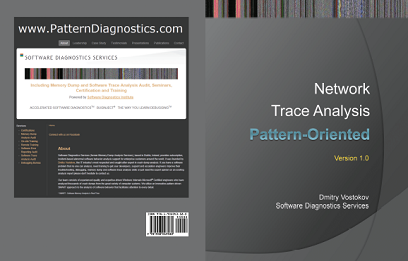
Introduction to Philosophy of Software Diagnostics, Part 1
The following direct links can be used to order the book now:
Buy Kindle version
Buy Paperback from Amazon
from Amazon
Buy Paperback from Barnes & Noble
Buy Paperback from Book Depository
This is a transcript of Software Diagnostics Services seminar about phenomenological, hermeneutical and analytical approaches to software diagnostics.
- Title: Philosophy of Software Diagnostics: An Introduction, Part 1
- Authors: Dmitry Vostokov, Software Diagnostics Services
- Publisher: OpenTask (September 2013)
- Language: English
- Product Dimensions: 28.0 x 21.6
- Paperback: 36 pages
- ISBN-13: 978-1908043571
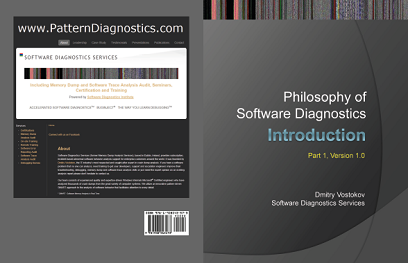
Victimware: The Missing Part of the Equation
The following direct links can be used to order the book now:
Buy Kindle or Paperback
or Paperback from Amazon
from Amazon
Buy Paperback from Barnes & Noble
Buy Paperback from Book Depository
Available for SkillSoft Books24x7 subscribers
Some software components are innocent victims of other component coding mistakes or deliberate subversion and some start as a part of crimeware and malware but eventually become victims themselves (they crash, hang, spike, leak, are dumped, subverted, etc.) This is a transcript of Software Diagnostics Services seminar about unified malware and victimware analysis by using behavioural and structural patterns including a live memory dump analysis example.
- Title: Victimware: The Missing Part of the Equation
- Authors: Dmitry Vostokov, Software Diagnostics Services
- Publisher: OpenTask (August 2013)
- Language: English
- Product Dimensions: 28.0 x 21.6
- Paperback: 28 pages
- ISBN-13: 978-1908043634
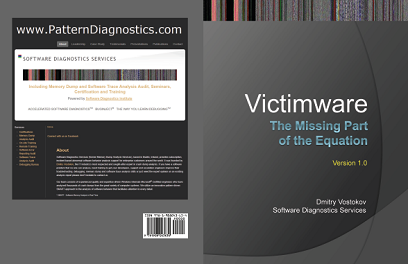
Introduction to Pattern-Based Software Diagnostics
The following direct links can be used to order the book now:
Buy Kindle version
Buy Paperback from Amazon
from Amazon
Buy Paperback from Barnes & Noble
Buy Paperback from Book Depository
Available for SkillSoft Books24x7 subscribers
This is a transcript of Software Diagnostics Services seminar about how pattern-based software diagnostics, troubleshooting and debugging address software post-construction problem solving pattern life cycle: from the discovery of a new pattern through its integration into an existing pattern catalogue and pattern language, testing, packaging and delivering to pattern consumers with subsequent usage, refactoring and writing case studies.
- Title: Pattern-Based Software Diagnostics: An Introduction
- Authors: Dmitry Vostokov, Software Diagnostics Services
- Publisher: OpenTask (August 2013)
- Language: English
- Product Dimensions: 28.0 x 21.6
- Paperback: 28 pages
- ISBN-13: 978-1908043498
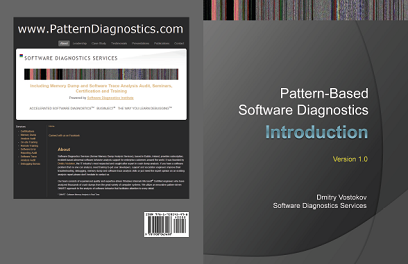
Agile Software Diagnostics
We introduce this method based on iterative and incremental pattern-oriented diagnostics we founded and developed during the last few years. It is currently based on 5 principles:
- Patterns are the principal measure of quality
- Attention to detail through checklists
- Analysis is done by motivated expertise-driven trusted individuals
- Customer satisfaction by useful analysis delivered in the shortest possible time
- Analysis audit as a pair diagnostics
Debugging TV
Welcome to Debugging TV and Frames series where each episode features some facet of debugging, memory dump, and software trace analysis on Windows, Mac OS X, and Android platforms in 8 slides in 8 minutes including live WinDbg (Windows) or GDB demonstration (Mac OS X, Linux) plus extra 8 minutes for you to ask questions.
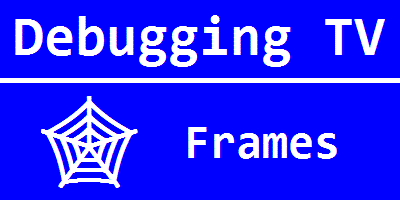
All episodes are available on YouTube with descriptions: http://www.youtube.com/DebuggingTV
Debugging TV Frame 0x01
Slides: DebuggingTV_Frame_0x01.pdf
WinDbg log: DebuggingTV_Frame_0x01.txt
Debugging TV Frame 0x02
Slides: DebuggingTV_Frame_0x02.pdf
From Q&A session: DIA SDK to access PDB symbol files
Debugging TV Frame 0x03
Slides: DebuggingTV_Frame_0x03.pdf
WinDbg log: DebuggingTV_Frame_0x03.txt
Debugging TV Frame 0x04
Slides: DebuggingTV_Frame_0x04.pdf
WinDbg log: DebuggingTV_Frame_0x04.txt
Note on Q&A: There was a question about the difference between .symopt-4 and .reload /f and indeed for the exercise purpose there was no difference. However I understood the question incorrectly and when I mentioned about forcing mismatched symbols load I meant .reload /f /i that we covered in the previous Frame Episode 0x02.
Debugging TV Frame 0x05
Slides: DebuggingTV_Frame_0x05.pdf
WinDbg log: DebuggingTV_Frame_0x05.txt
Debugging TV Frame 0x06
Slides: DebuggingTV_Frame_0x06.pdf
WinDbg log: DebuggingTV_Frame_0x06.txt
Debugging TV Frame 0x07
Slides: DebuggingTV_Frame_0x07.pdf
WinDbg log: DebuggingTV_Frame_0x07.txt
Debugging TV Frame 0x08
Slides: DebuggingTV_Frame_0x08.pdf
WinDbg log: DebuggingTV_Frame_0x08.txt
API description: contexts.h
Debugging TV Frame 0x09
Slides: DebuggingTV_Frame_0x09.pdf
WinDbg log 1: DebuggingTV_Frame_0x09-1.txt
WinDbg log 2: DebuggingTV_Frame_0x09-2.txt
Debugging TV Frame 0x0A (Mac OS X)
Slides: DebuggingTV_Frame_0x0A.pdf
Debugging TV Frame 0x0B (Mac OS X)
Slides: DebuggingTV_Frame_0x0B.pdf
Debugging TV Frame 0x0C (Mac OS X)
Crash report: MultipleThreads_2012-04-06-092234_DumpAnalysis-MacBook-Air.crash
Slides: DebuggingTV_Frame_0x0C.pdf
Debugging TV Frame 0x0D (Mac OS X)
Crash report: SpikingThread_2012-05-04-174941_DumpAnalysis-MacBook-Air.crash
Slides: DebuggingTV_Frame_0x0D.pdf
Debugging TV Frame 0x0E (Mac OS X)
Crash report: HeapCorruption2_2012-05-24-111258_DumpAnalysis-MacBook-Air.crash
Crash report: DoubleFree_2012-05-24-130929_DumpAnalysis-MacBook-Air.crash
Slides: DebuggingTV_Frame_0x0E.pdf
Debugging TV Frame 0x0F (Mac OS X)
Slides: DebuggingTV_Frame_0x0F.pdf
Debugging TV Frame 0x10 (General Software Diagnostics)
Slides: DebuggingTV_Frame_0x10.pdf
Debugging TV Frame 0x11 (Windows, Mac OS X)
Slides: DebuggingTV_Frame_0x11.pdf
Debugging TV Frame 0x12 (Mac OS X)
Slides: DebuggingTV_Frame_0x12.pdf
Debugging TV Frame 0x13 (Mac OS X)
Slides: DebuggingTV_Frame_0x13.pdf
Debugging TV Frame 0x14 (Windows)
Slides: DebuggingTV_Frame_0x14.pdf
Debugging TV Frame 0x15 (Windows)
Slides: DebuggingTV_Frame_0x15.pdf
MessageHistory x86 log: messages32.txt
MessageHistory x64 log: messages64.txt
Debugging TV Frame 0x16 (Windows)
Slides: DebuggingTV_Frame_0x16.pdf
WinDbg log (process dump): windbg-old-hangs-on-windows8-dump.txt
WinDbg log (complete dump): memory-windows8.txt
Debugging TV Frame 0x17 (Windows)
Slides: DebuggingTV_Frame_0x17.pdf
Debugging TV Frame 0x18 (Windows)
Slides: DebuggingTV_Frame_0x18.pdf
WinDbg log: logfile.txt
Source code: FrameNavigation.txt
Debugging TV Frame 0x19 (Windows)
Slides: DebuggingTV_Frame_0x19.pdf
Debugging TV Frame 0x1A (Software Diagnostics Architecture)
Slides: DebuggingTV_Frame_0x1A.pdf
Debugging TV Frame 0x1B (Windows)
Slides: DebuggingTV_Frame_0x1B.pdf
WinDbg log (iexplore memory dump analysis): iexplore-dump-analysis.txt
WinDbg log (iexplore live analysis): iexplore-live-analysis.txt
Debugging TV Frame 0x1C (Windows)
Slides: DebuggingTV_Frame_0x1C.pdf
WinDbg log: Episode-0x1C-1-no-lsass.txt
WinDbg log: Episode-0x1C-2-fibre-bundle-user-space.txt
WinDbg log: Episode-0x1C-3-fibre-bundle-kernel-space.txt
WinDbg log: Episode-0x1C-4-file-copy-spike-wrl-symbols.txt
Debugging TV Frame 0x20 (Windows)
Slides: DebuggingTV_Frame_0x20.pdf
WinDbg log: InjectionResidue.txt
Debugging TV Frame 0x21 (Windows)
Slides: DebuggingTV_Frame_0x21.pdf
Debugging TV Frame 0x22 (Windows)
Slides: DebuggingTV_Frame_0x22.pdf
Debugging TV Frame 0x23 (Windows)
Slides: DebuggingTV_Frame_0x23.pdf
Debugging TV Frame 0x24 (Windows)
Slides: DebuggingTV_Frame_0x24.pdf
Source code: PastStackTrace.txt
WinDbg log (x86): PastStackTrace32.txt
WinDbg log (x64): PastStackTrace64.txt
Debugging TV Frame 0x25 (Windows)
Slides: DebuggingTV_Frame_0x25.pdf
WinDbg log: Episode-0x25-windbg-log.txt
Debugging TV Frame 0x26 (Windows)
Slides: DebuggingTV_Frame_0x26.pdf
Source code: BufferUnderwrite.cpp
WinDbg log 1: NormalHeap.txt
WinDbg log 2: FullPageHeap.txt
WinDbg log 3: FullPageHeapBackwards.txt
Debugging TV Frame 0x27 (Windows)
Slides: DebuggingTV_Frame_0x27.pdf
WinDbg log: Episode-0x27-windbg-log.txt
Debugging TV Frame 0x28 (Windows)
Slides: DebuggingTV_Frame_0x28.pdf
WinDbg log: Episode-0x28-windbg-log.txt
Debugging TV Frame 0x29 (Windows)
Slides: DebuggingTV_Frame_0x29.pdf
WinDbg log: Episode-0x29-windbg-log.txt
Debugging TV Frame 0x30 (Windows)
Slides: DebuggingTV_Frame_0x30.pdf
Debugging TV Frame 0x31 (Windows)
Slides: DebuggingTV_Frame_0x31.pdf
WinDbg log: Episode-0x31-WinDbg-log.txt
Debugging TV Frame 0x32 (Android)
Slides: DebuggingTV_Frame_0x32.pdf
Java code: FullscreenActivityJava.txt
Android log (fragments): StackTraceCollectionLog.txt
Debugging TV Frame 0x33 (Android)
Slides: DebuggingTV_Frame_0x33.pdf
Java code for SpikingThread app: FullscreenActivitySpikingThreadJava.txt
Java code for Deadlock app: FullscreenActivityDeadlockJava.txt
Android log (fragments) for SpikingThread app: SpikingThreadLog.txt
Android log (fragments) for Deadlock app: DeadlockLog.txt
The output of top command (ADB): top.txt
The output of ps -t command (ADB): ps-t.txt
Debugging TV Frame 0x34 (Android)
Slides: DebuggingTV_Frame_0x34.pdf
More frames are coming and www.debugging.tv hosts TV programme and recordings of past episodes.
Introduction to Systemic Software Diagnostics
The following direct links can be used to order the book now:
Buy Kindle version
Buy Paperback from Amazon
from Amazon
Buy Paperback from Barnes & Noble
Buy Paperback from Book Depository
Available for SkillSoft Books24x7 subscribers
This is a transcript of Software Diagnostics Services seminar about how to apply systems theory and systems thinking for effective and efficient abnormal software behaviour diagnostics: the foundation of software troubleshooting and debugging.
- Title: Systemic Software Diagnostics: An Introduction
- Authors: Dmitry Vostokov, Software Diagnostics Services
- Publisher: OpenTask (July 2013)
- Language: English
- Product Dimensions: 28.0 x 21.6
- Paperback: 32 pages
- ISBN-13: 978-1908043399

The Structure of Software Problem Solving Organization
Based on the separation of problem solving powers we propose the following software problem solving triangle with a separate software diagnostics department:
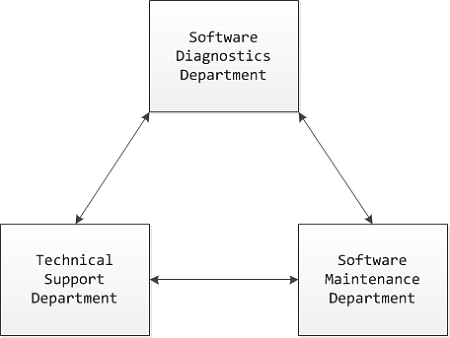
In the forthcoming Webinar we outline the benefits of this approach.
Bridging The Great Divide
In Pattern-Based Software Diagnostics seminar we proposed to use pattern catalogues to bridge the separation of software construction and memory dump software diagnostics. With an introduction of Motifs to trace and log analysis pattern catalogue it is now possible (at least conceptually) to bridge construction and trace analysis too:
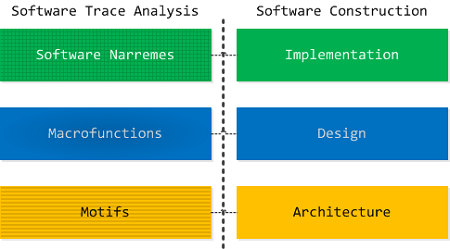
Elementary Software Diagnostics Patterns
These are patterns of abnormal software behaviour that affect software users and trigger the application of pattern-oriented software diagnostics and debugging if necessary. The initial list of relevant elementary patterns include:
- Functional
- Use-case Deviation
- Non-functional
- Crash
- Hang (includes delays*)
- Counter Value (includes resource leaks, CPU spikes)
- Error Message
* In choosing the pattern vocabulary we decided to use ordinary names, for example, Hang was chosen instead of Response Delay.
Windows Memory Analysis Checklist
General:
- Symbol servers (.symfix)
- Internal database(s) search
- Google or Microsoft search for suspected components as this could be a known issue. Sometimes a simple search immediately points to the fix on a vendor’s site
- The tool used to save a dump (to flag false positive, incomplete or inconsistent dumps)
- OS/SP version (version)
- Language
- Debug time
- System uptime
- Computer name (dS srv!srvcomputername or !envvar COMPUTERNAME)
- List of loaded and unloaded modules (lmv or !dlls)
- Hardware configuration (!sysinfo)
- .kframes 1000
Application or service:
- Default analysis (!analyze -v or !analyze -v -hang for hangs)
- Critical sections (!cs -s -l -o, !locks) for both crashes and hangs
- Component timestamps, duplication and paths. DLL Hell? (lmv and !dlls)
- Do any newer components exist?
- Process threads (~*kv or !uniqstack) for multiple exceptions and blocking functions
- Process uptime
- Your components on the full raw stack of the problem thread
- Your components on the full raw stack of the main application thread
- Process size
- Number of threads
- Gflags value (!gflag)
- Time consumed by threads (!runaway)
- Environment (!peb)
- Import table (!dh)
- Hooked functions (!chkimg)
- Exception handlers (!exchain)
- Computer name (!envvar COMPUTERNAME)
- Process heap stats and validation (!heap -s, !heap -s -v)
- CLR threads? (mscorwks or clr modules on stack traces) Yes: use .NET checklist below
- Hidden (unhandled and handled) exceptions on thread raw stacks
System hang:
- Default analysis (!analyze -v -hang)
- ERESOURCE contention (!locks)
- Processes and virtual memory including session space (!vm 4)
- Important services are present and not hanging
- Pools (!poolused)
- Waiting threads (!stacks)
- Critical system queues (!exqueue f)
- I/O (!irpfind)
- The list of all thread stack traces (!process 0 3f)
- LPC/ALPC chain for suspected threads (!lpc message or !alpc /m after search for "Waiting for reply to LPC" or "Waiting for reply to ALPC" in !process 0 3f output)
- RPC threads (search for "RPCRT4!OSF" in !process 0 3f output)
- Mutants (search for "Mutant - owning thread" in !process 0 3f output)
- Critical sections for suspected processes (!cs -l -o -s)
- Sessions, session processes (!session, !sprocess)
- Processes (size, handle table size) (!process 0 0)
- Running threads (!running)
- Ready threads (!ready)
- DPC queues (!dpcs)
- The list of APCs (!apc)
- Internal queued spinlocks (!qlocks)
- Computer name (dS srv!srvcomputername)
- File cache, VACB (!filecache)
- File objects for blocked thread IRPs (!irp -> !fileobj)
- Network (!ndiskd.miniports and !ndiskd.pktpools)
- Disk (!scsikd.classext -> !scsikd.classext class_device 2)
- Modules rdbss, mrxdav, mup, mrxsmb in stack traces
- Functions Ntfs!Ntfs*, nt!Fs* and fltmgr!Flt* in stack traces
BSOD:
- Default analysis (!analyze -v)
- Pool address (!pool)
- Component timestamps (lmv)
- Processes and virtual memory (!vm 4)
- Current threads on other processors
- Raw stack
- Bugcheck description (including ln exception address for corrupt or truncated dumps)
- Bugcheck callback data (!bugdump for systems prior to Windows XP SP1)
- Bugcheck secondary callback data (.enumtag)
- Computer name (dS srv!srvcomputername)
- Hardware configuration (!sysinfo)
.NET application or service:
- CLR module and SOS extension versions (lmv and .chain)
- Managed exceptions (~*e !pe)
- Nested managed exceptions (!pe -nested)
- Managed threads (!Threads -special)
- Managed stack traces (~*e !CLRStack)
- Managed execution residue (~*e !DumpStackObjects and !DumpRuntimeTypes)
- Managed heap (!VerifyHeap, !DumpHeap -stat and !eeheap -gc)
- GC handles (!GCHandles, !GCHandleLeaks)
- Finalizer queue (!FinalizeQueue)
- Sync blocks (!syncblk)
Introduction to Pattern-Driven Software Diagnostics
The following direct links can be used to order the book now:
Buy Kindle or Paperback
or Paperback from Amazon
from Amazon
Buy Paperback from Barnes & Noble
Buy Paperback from Book Depository
Available for SkillSoft Books24x7 subscribers
This is a transcript of Software Diagnostics Services seminar about different pattern categories for effective and efficient abnormal software behaviour diagnostics: the foundation of scalable and cost-effective pattern-driven software support.
- Title: Pattern-Driven Software Diagnostics: An Introduction
- Authors: Dmitry Vostokov, Software Diagnostics Services
- Publisher: OpenTask (April 2013)
- Language: English
- Product Dimensions: 28.0 x 21.6
- Paperback: 32 pages
- ISBN-13: 978-1908043382
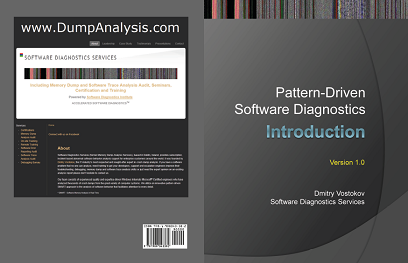
Unified Computer Diagnostics: Incorporating Hardware Narratology
Interpreting hardware signals as messages and messages as signals allows us to apply Software Narratology and software trace analysis patterns to the domain of hardware diagnostics:
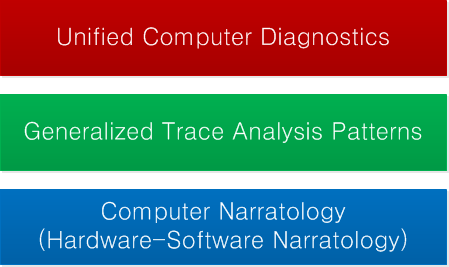
Generalized trace analysis patterns and narrative extends the view of hardware-software traces and logs as temporarily ordered event sequences. The time domain is generalized to any arbitrary set such as a list of indexes or pointers or even memory itself. This gives a unification of memory and log analysis and application of Computer Narratology (*) to memory dump analysis as well.
(*) We call the application of methods of literary narratology to computer trace and log analysis and computer-related stories in general as Hardware-Software Narratology or simply Computer Narratology as it was originally done in Memory Dump Analysis Anthology, Volume 3 when we first introduced Software Narratology.
Zero Fault Software Diagnostics
Software diagnostics is used whenever there is a fault that triggers some kind of an artefact such as a memory dump or a software trace. It is also used proactively in software and network monitoring. We combine all these uses with our pattern-oriented approach to anticipate faults before their occurrence:
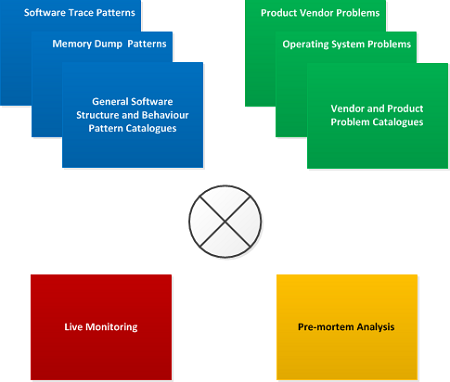
Such preventive software diagnostics consists from 4 interrelated parts:
- General software structure and behaviour pattern catalogues
- Domain, vendor and product specific problem catalogues
- Live monitoring
- Pre-mortem analysis
Pre-mortem here means preventive memory dump analysis. It is similar to post-mortem analysis but artefacts are collected and analysed proactively before any actual problem. In some sense pre-mortem analysis is a part of live monitoring but we confine the latter to software trace and log analysis.
Memory Dump Analysis Anthology, Volume 6
The following direct links can be used to order the book now:
Buy Kindle version
Buy Paperback or Hardcover
or Hardcover from Amazon
from Amazon
Buy Paperback or Hardcover from Barnes & Noble
Buy Paperback or Hardcover from Book Depository
Also available in PDF format from Software Diagnostics Services
Contains revised, edited, cross-referenced, and thematically organized selected DumpAnalysis.org blog posts about memory dump and software trace analysis, software troubleshooting and debugging written in November 2010 - October 2011 for software engineers developing and maintaining products on Windows platforms, quality assurance engineers testing software on Windows platforms, technical support and escalation engineers dealing with complex software issues, and security researchers, malware analysts and reverse engineers. The sixth volume features:
- 56 new crash dump analysis patterns including 14 new .NET memory dump analysis patterns
- 4 new pattern interaction case studies
- 11 new trace analysis patterns
- New Debugware pattern
- Introduction to UI problem analysis patterns
- Introduction to intelligence analysis patterns
- Introduction to unified debugging pattern language
- Introduction to generative debugging, metadefect template library and DNA of software behavior
- The new school of debugging
- .NET memory dump analysis checklist
- Software trace analysis checklist
- Introduction to close and deconstructive readings of a software trace
- Memory dump analysis compass
- Computical and Stack Trace Art
- The abductive reasoning of Philip Marlowe
- Orbifold memory space and cloud computing
- Memory worldview
- Interpretation of cyberspace
- Relationship of memory dumps to religion
- Fully cross-referenced with Volume 1, Volume 2, Volume 3, Volume 4, and Volume 5
Product information:
- Title: Memory Dump Analysis Anthology, Volume 6
- Author: Dmitry Vostokov
- Language: English
- Product Dimensions: 22.86 x 15.24
- Paperback: 306 pages
- Publisher: Opentask (January 2013)
- ISBN-13: 978-1-908043-19-1
- Hardcover: 306 pages
- Publisher: Opentask (January 2013)
- ISBN-13: 978-1-908043-20-7
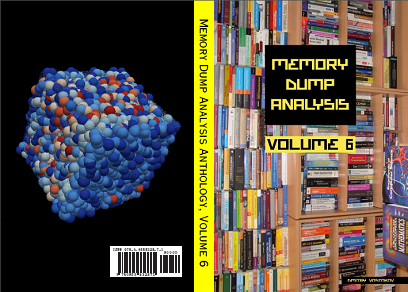
Back cover features 3d memory space visualization image created with ParaView.
Pattern-Oriented Software Diagnostics
consists of two main parts:
- Pattern-Driven process of finding patterns from existing pattern catalogs
- Pattern-Based evolution of pattern catalogs and pattern relationships
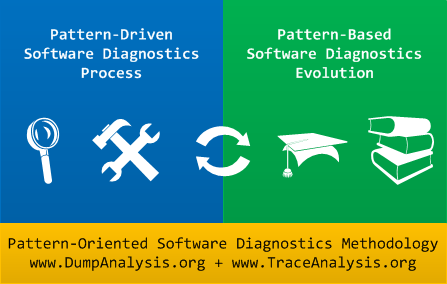
Book: Accelerated Windows Software Trace Analysis
The following direct links can be used to order the book now:
Buy Kindle version
Buy Paperback from Amazon
from Amazon
Buy Paperback from Barnes & Noble
Buy Paperback from Book Depository
Available for SkillSoft Books24x7 subscribers
Also available in PDF format + recording from Software Diagnostics Services.
The full transcript of Software Diagnostics Services training. Feel frustrated when opening a software trace with millions of messages from hundreds of software components, threads and processes? Go beyond simple CPU and disk hog monitoring or searching for errors in a text and learn how to efficiently and effectively analyze software traces and logs from complex software environments. Covered popular software logs and trace formats from Microsoft and Citrix products and tools including Event Tracing for Windows (ETW) and Citrix Common Diagnostics Format (CDF). This course teaches using pioneering and innovative pattern-driven and pattern-based analysis of abnormal software behavior incidents developed by Software Diagnostics Institute.
- Title: Accelerated Windows Software Trace Analysis: Training Course Transcript
- Authors: Dmitry Vostokov, Software Diagnostics Services
- Publisher: OpenTask (January 2013)
- Language: English
- Product Dimensions: 28.0 x 21.6
- Paperback: 130 pages
- ISBN-13: 978-1908043429
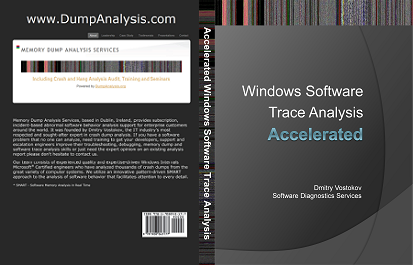
Software Trace Analysis Problem Domain Pattern Hierarchy
Software log analysis patterns from Software Diagnostics Institute are independent from any OS, platform or product because they are based on viewing software logs as stories of computation and were discovered by application of narratological analysis (software narratology). In addition to these patterns there exist domain specific problem patterns such as wrong hotfix level or specific product error code during software installation or execution. Typical examples of support for such platform and product specific type of patterns include Microsoft Windows Problem Reporting and Citrix Auto Support.
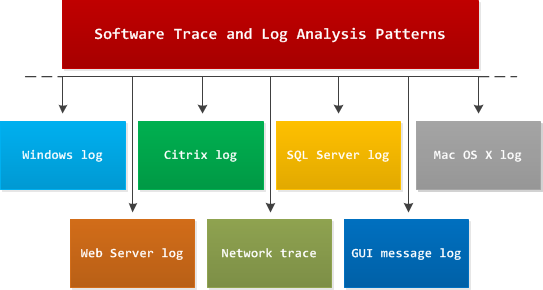
Software Diagnostics Discipline
Let’s define software diagnostics as a discipline studying abnormal software structure and behavior in software execution artifacts (such as memory dumps, software and network traces and logs) using pattern-driven, systemic and pattern-based analysis methodologies.
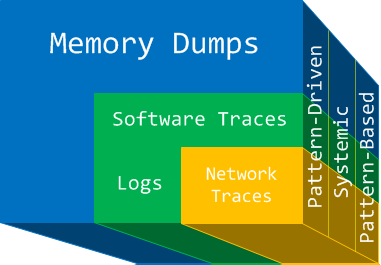
Pattern-Based v. Pattern-Driven Software Diagnostics
Pattern-driven software post-construction problem solving involves using preexisting pattern languages and pattern catalogs for software diagnostics, troubleshooting and debugging. Pattern-based software post-construction problem solving addresses PLS (Pattern Life Cycle) - from the discovery of a new pattern through its integration into an existing catalog and language, testing, packaging and delivering to pattern consumers with subsequent usage, refactoring and writing case studies:
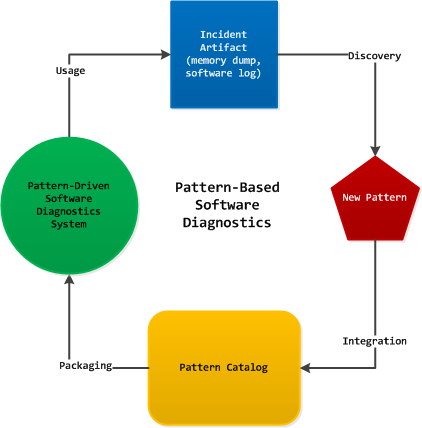
Software Diagnostics Certifications
The first software diagnostics certification in memory dump analysis starts this September and will be administered by Software Diagnostics Services:
http://www.patterndiagnostics.com/memory-dump-analysis-certification-out...
We also plan a beta software trace analysis certification.
For companies there is also available Software Diagnostics Maturity enterprise certification:
http://www.patterndiagnostics.com/software-diagnostics-maturity
CARE: Crash Analysis Report Environment
Welcome to the project CARE!
We now also accept GDB logs and crash reports from Mac OS X and iOS.
CARE means Crash Analysis Report Environment. It includes a pattern-driven debugger log analyzer and standards for structured audience-driven reports. The system architecture is described here.
Please help to populate the database of stack traces by submitting your WinDbg and GDB output logs including Mac OS X and iOS crash reports. For Windows you can use VBScript / WinDbg script to process all .DMP files on your hard drives: DebuggerLogs.zip. The archive contains VBScript file for x64 WinDbg (DebuggerLogs64.vbs) and for x86 WinDbg (DebuggerLogs.vbs) plus the very simple mode-independent WinDbg script (DebuggerLogs.wds). The WinDbg output is stored in dbgeng.log file.
Note: Please do not submit your crash or core dumps because the file size is limited to 2 MB and CARE system is currently being designed to analyze debugger logs and crash reports only. If your log is bigger you can submit a zip file. If you have any problems please contact the administrator. Please do not expect any crash analysis response for your logs or reports. The submittal is currently for internal CARE database population only and not for the pattern analysis of your computer memory.
Rosetta Stone for Debuggers
Under inscription...
The name for this table was suggested by Joshua J. Drake and first propagated to me by @jcran
Action | GDB | WinDbg ---------------------------------------------------------------- Start the process | run | g Exit | (q)uit | q Disassemble (forward) | (disas)semble | uf, u Disassemble N instructions | x/<N>i | - Disassemble (backward) | disas <a-o> <a> | ub Stack trace | backtrace (bt) | k Full stack trace | bt full | kv Stack trace with parameters | bt full | kP Partial trace (innermost) | bt <N> | k <N> Partial trace (outermost) | bt -<N> | - Stack trace for all threads | thread apply all bt | ~*k Breakpoint | break | bp Frame numbers | any bt command | kn Select frame | frame | .frame Display parameters | info args | dv /t /i /V Display locals | info locals | dv /t /i /V Dump byte char array | x/<N>bc | db Switch to thread | thread <N> | ~<N>s Sections/regions | maint info sections | !address Load symbol file | add-symbol-file | .reload CPU registers | i(nfo) r | r
The current version is from April 30th, 2012:
http://www.dumpanalysis.org/blog/index.php/2012/04/30/gdb-for-windbg-users-part-8/
To Do:
- Split rows by categories
- Add links to command descriptions, examples, relevant patterns
Introduction to Software Narratology
The following direct links can be used to order the book now:
Buy Kindle or Paperback
or Paperback from Amazon
from Amazon
Buy Paperback from Barnes & Noble
Buy Paperback from Book Depository
This is a transcript of Memory Dump Analysis Services seminar about Software Narratology: an exciting new discipline and a field of research founded by DumpAnalysis.org. When software executes it gives us its stories in the form of UI events, software traces and logs. Such stories can be analyzed for their structure and patterns for troubleshooting, debugging and problem resolution purposes. Topics also include software narremes and their types, anticipatory software construction and software diagnostics.
- Title: Software Narratology: An Introduction to the Applied Science of Software Stories
- Authors: Dmitry Vostokov, Memory Dump Analysis Services
- Publisher: OpenTask (April 2012)
- Language: English
- Product Dimensions: 28.0 x 21.6
- Paperback: 26 pages
- ISBN-13: 978-1908043078
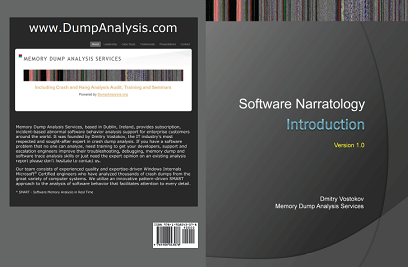
Software Narratology
This newly expanded field studies all types of narratives in software construction and post-construction.
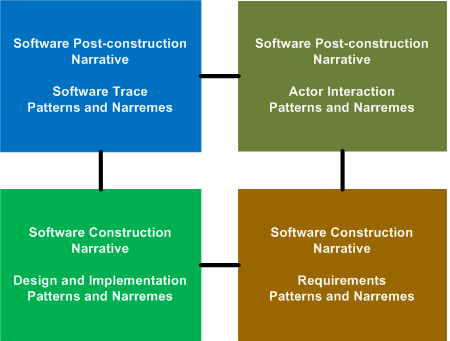
For details please visit our blog:
http://www.dumpanalysis.org/blog/index.php/2012/03/11/software-narratolo...
http://www.dumpanalysis.org/blog/index.php/2012/03/11/software-narrative...
http://www.dumpanalysis.org/blog/index.php/2012/02/02/narremes-in-softwa...
Memoretics Helps Writing Fiction
One of sources of Memoretics is Narratology to which the former contributes back by providing structural and behavioral analysis patterns and frameworks.
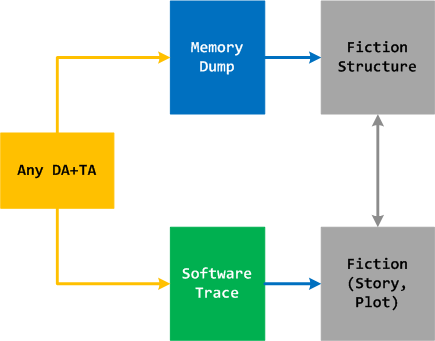
For the full story please visit our blog: http://www.dumpanalysis.org/blog/index.php/2012/02/13/software-narratolo...
